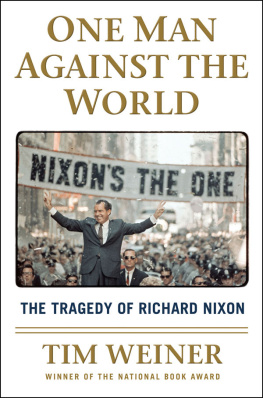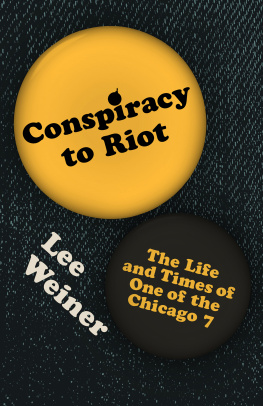Tim Weiner - Enemies: A History of the FBI
Here you can read online Tim Weiner - Enemies: A History of the FBI full text of the book (entire story) in english for free. Download pdf and epub, get meaning, cover and reviews about this ebook. year: 2012, publisher: Random House Publishing Group, genre: History. Description of the work, (preface) as well as reviews are available. Best literature library LitArk.com created for fans of good reading and offers a wide selection of genres:
Romance novel
Science fiction
Adventure
Detective
Science
History
Home and family
Prose
Art
Politics
Computer
Non-fiction
Religion
Business
Children
Humor
Choose a favorite category and find really read worthwhile books. Enjoy immersion in the world of imagination, feel the emotions of the characters or learn something new for yourself, make an fascinating discovery.
- Book:Enemies: A History of the FBI
- Author:
- Publisher:Random House Publishing Group
- Genre:
- Year:2012
- Rating:3 / 5
- Favourites:Add to favourites
- Your mark:
- 60
- 1
- 2
- 3
- 4
- 5
Enemies: A History of the FBI: summary, description and annotation
We offer to read an annotation, description, summary or preface (depends on what the author of the book "Enemies: A History of the FBI" wrote himself). If you haven't found the necessary information about the book — write in the comments, we will try to find it.
Enemies: A History of the FBI — read online for free the complete book (whole text) full work
Below is the text of the book, divided by pages. System saving the place of the last page read, allows you to conveniently read the book "Enemies: A History of the FBI" online for free, without having to search again every time where you left off. Put a bookmark, and you can go to the page where you finished reading at any time.
Font size:
Interval:
Bookmark:


Copyright 2012 by Tim Weiner
All rights reserved.
Published in the United States by Random House, an imprint of The Random House Publishing Group, a division of Random House, Inc . , New York .
R ANDOM H OUSE and colophon are registered trademarks of Random House, Inc.
Some of the oral histories in this book are copyrighted by the Society of Former Special Agents of the Federal Bureau of Investigation and cited here with permission.
eISBN: 978-0-679-64389-0
www.atrandom.com
Jacket design: Base Art Co.
v3.1
Safety from external danger is the most powerful director of national conduct. Even the ardent love of liberty will, after a time, give way to its dictates. The violent destruction of life and property incident to war, the continual effort and alarm attendant on a state of continual danger, will compel nations the most attached to liberty to resort for repose and security to institutions which have a tendency to destroy their civil and political rights. To be more safe, they at length become willing to run the risk of being less free .
A LEXANDER H AMILTON , 1787C ONTENTS

A UTHORS N OTE

E NEMIES IS THE HISTORY of the Federal Bureau of Investigation as a secret intelligence service. We think of the FBI as a police force, arresting criminals and upholding the rule of law. But secret intelligence against terrorists and spies is the Bureaus first and foremost mission today, and that has been true for most of the past hundred years.
This mission creates a conflict that the authors of the Constitution foresaw ten generations ago. A free people must have both security and liberty. They are warring forces, yet we cannot have one without the other. Secret agents can be scofflaws; their traditions include wiretapping, bugging, and burglary. Over the decades, the Bureau has best served the cause of national security by bending and breaking the law. A secret police is anathema in a democracy. But the FBIs powers make it Americas closest counterpart.
Enemies is the chronicle of a century of constant conflict over the conduct of secret intelligence in an open democracy, the tug-of-war between national security and civil liberties, the saga of our struggle to be both safe and free. It is written on the record, without anonymous sources or blind quotations. It is based on a foundation of more than seventy thousand pages of recently declassified documents, including an extraordinary collection of the intelligence files of J. Edgar Hoover, and more than two hundred oral histories recorded by agents who served during and after his forty-eight-year tenure as the leader of the FBI.
Hoover stands at the center of the American century like a statue encrusted in grime. His loyalists saw him as a visionary genius. His opponents saw him as a goddamned sewer, in the words of President Kennedys national security adviser. Today millions of Americans know him only as a caricature: a tyrant in a tutu, a cross-dressing crank. None of that is true. The files opened over the past few years strip away layers of myth and legend. They show him in a new light. He carried out secret missions that were almost inconceivable in their time, spying directly on the leaders of the Soviet Union and China in the darkest days of the Cold War, sending detailed intelligence warnings of suicidal airborne attacks against New York and Washington, controlling a coup against a democratically elected foreign leader, and subtly undermining presidents of the United States.
Hoover was not a monster. He was an American Machiavelli. He was astute, he was cunning, and he never stopped watching his enemies. He was a founding father of American intelligence and the architect of the modern surveillance state. Every fingerprint on file, every byte of biographic and biometric data in the computer banks of the government, owes its origins to him.
He was a masterful manipulator of public opinion. He practiced political warfare and secret statecraft in pursuit of national security, often at the expense of morality. He fought communism and terrorism with a consuming passion for fifty-five years. From the 1940s onward, until the day he died, he foresaw the apocalyptic threats we face today. Yet he left behind an institution that almost died along with him, and has only revived its national-security mission under law in the past three years.
The FBI has never had a legal charter beyond the presidents oath to take care that the laws are faithfully executed, and presidents have strained against the strictures of that oath since World War I. They ordered Hoover to persecute pacifists as well as terrorists; they targeted the heroes of the civil rights movement along with the knights of the Ku Klux Klan. At their command, the Bureau has violated the freedoms of the Bill of Rights to enforce the presidents powers as commander in chief. The Constitution has never greatly bothered any wartime president, Franklin D. Roosevelts attorney general once wroteand every president since has seen himself at war.
Enemies is a record of illegal arrests and detentions, break-ins, burglaries, wiretapping, and bugging on behalf of the president. By design, it touches only briefly on famous criminal-justice caseslike the war on gangsters in the Great Depression and the bloody confrontation with the Branch Davidians cultto focus on the FBIs secret intelligence operations. But that is the heart of the story of Americas hundred-year war against terrorists, spies, anarchists, and assassins. The commanders in this battlepresidents, attorneys general, and FBI directors alikehave used and abused their powers in the name of national security. Yet even their powers have limits in our democracy. Late in his life, Hoover refused to execute illegal orders from President Nixon. And Robert Mueller, the Bureaus director since September 4, 2001, resisted President Bushs commands to carry out unlawful secret surveillance; he offered his resignation in protest. He has said we will not win the war on terrorism if we lose our freedoms in the battle.
The FBIs leaders live each day in that state of continual conflict. Americans need to know the history of that struggle. If not, when the next crisis comes, they will surrender guarantees of liberty for promises of security. They may be more safe, but they will be less free.
P ART I
SPIES AND SABOTEURS
 The September 1920 bombing of Wall Street: a terrorist attack that went unsolved .
The September 1920 bombing of Wall Street: a terrorist attack that went unsolved . 
ANARCHY
J . E DGAR H OOVER WENT TO WAR at the age of twenty-two, on Thursday morning, July 26, 1917. He walked out of his boyhood home in Washington, D.C., and set off for his new life at the Justice Department, to serve as a foot soldier in the army of lawmen fighting spies, saboteurs, Communists, and anarchists in the United States.
America had entered World War I in April. The first waves of her troops were landing in France, unprepared for the horrors that faced them. On the home front, Americans were gripped by the fear of sabotage by German secret agents. The country had been on high alert for a year, ever since an enemy attack on a huge warehouse of American munitions bound for the battlefront. The blast at Black Tom Island, on the western edge of New York Harbor, had set off two thousand tons of explosives in the dark of a midsummer night. Seven people died at the site. In Manhattan, thousands of windows were shattered by the shock waves. The Statue of Liberty was scarred by shrapnel.
Next pageFont size:
Interval:
Bookmark:
Similar books «Enemies: A History of the FBI»
Look at similar books to Enemies: A History of the FBI. We have selected literature similar in name and meaning in the hope of providing readers with more options to find new, interesting, not yet read works.
Discussion, reviews of the book Enemies: A History of the FBI and just readers' own opinions. Leave your comments, write what you think about the work, its meaning or the main characters. Specify what exactly you liked and what you didn't like, and why you think so.














